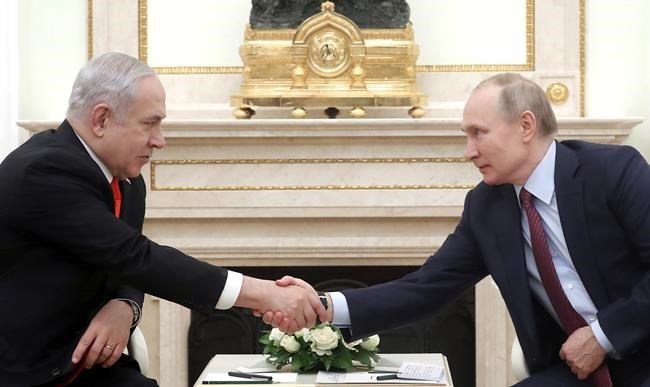
FILE - Russian President Vladimir Putin, right, shakes hands with Israeli Prime Minister Benjamin Netanyahu during their meeting in the Kremlin in Moscow, Russia, Thursday, Jan. 30, 2020. Russia and Israel have steadily expanded trade and other contacts and strengthened security ties, and Moscow has been guarded in commenting on the Gaza fighting. (Maxim Shemetov/Pool Photo via AP, File)
Republished October 27, 2023 - 6:23 AM
Original Publication Date October 27, 2023 - 3:46 AM
A senior Iranian envoy met with Hamas representatives in Moscow following talks with Russian diplomats that underscored Moscow's efforts to expand its clout as a power broker in the latest Israel-Hamas war, Russian and Iranian media said Friday.
During the meeting with Hamas' representative Moussa Abu Marzouk, Iran’s deputy foreign minister, Ali Bagheri Kani, emphasized the need for a cease-fire, lifting the blockade of the Gaza Strip and providing humanitarian assistance, according to a statement Friday by the Iranian Embassy in Moscow. The statement was carried by Russian state news agencies.
Iran’s state-run IRNA news agency said Abu Marzouk told Bagheri Khani that he appreciated Iran’s support for the Palestinian people.
Prior to the meeting, Abu Marzouk held talks Thursday with Russian diplomats. His Moscow visit drew strong condemnation by Israel. The Russian Foreign Ministry said they discussed the release of hostages in the Gaza Strip and the evacuation of foreigners.
The talks highlighted Russia's efforts to insert itself as a mediator in the wake of Hamas' deadly Oct. 7 incursion into southern Israel — even though it continues to be occupied with its war in Ukraine. At least 19 Russian citizens have died in the Israel-Hamas war.
Russian President Vladimir Putin declared earlier this month that Moscow could act as mediator because of its friendly ties with both Israel and the Palestinians, adding that “no one could suspect us of playing up to one party.”
Despite that claim of even-handedness, a U.N. Security Council resolution that Russia previously submitted condemning violence against civilians made no mention of Hamas. The statement was rejected by the council.
The Israeli Foreign Ministry slammed Russia's decision to invite Hamas representatives to Moscow as “an act of support of terrorism," and called for the delegation to be expelled from Russia.
Kremlin spokesman Dmitry Peskov responded Friday by saying that Moscow believes it is necessary to maintain contacts with all parties. It is not clear if representatives from Russia, Iran and Hamas all met together on Thursday.
Abu Marzouk told Russia's state RIA Novosti news agency in remarks published on Friday that he and Russian diplomats discussed issues related to the Palestinian problem and “how we can jointly determine a future for the region and the entire humankind that would differ from (the one) that the U.S. tries to paint.”
He noted that Russia’s invitation to Hamas to visit was a “message to the entire world that Russia considers Hamas not a terrorist but a liberation movement that defends the rights of its people and wages a war for justice.”
Moscow has been guarded in commenting on the war between Israel and Hamas as it has steadily expanded trade and other contacts and strengthened security ties with Israel over the past years. However, Hamas' visit reflects Moscow's view of its relationship with the group and its backer Iran as crucial to maintaining its influence in the region.
According to Washington-based think tank the Carnegie Endowment for International Peace, for Moscow, the war in Gaza “is an opportunity to pitch itself ... as a diplomatic partner” in a region it considers “strategically important.”
Since the collapse of the Soviet Union, Russia and Israel have steadily expanded trade and security ties and many Russians moved to Israel after Putin invaded Ukraine. But that invasion has tested relations — Israel has voiced support for Kyiv but refused to provide it with weapons, while many Israelis were angered by Putin’s claim that Ukraine's Jewish president, Volodymyr Zelenskyy, is a neo-Nazi.
Putin's war in Ukraine has also led Moscow to deepen ties with Iran. Iran has provided Moscow with hundreds of Shahed exploding drones that the Russian military has used against Ukraine’s energy facilities and other key infrastructure. Iran also has reportedly shared its drone technology with Russia, which built a facility to produce them.
In return, Moscow is expected to offer Iran advanced fighter jets and other modern weapons.
On Thursday, Bagheri Khani met with Russia’s Deputy Foreign Minister Mikhail Bogdanov, who serves as the Kremlin envoy to the Mideast, and other senior Russian diplomats. The Russian Foreign Ministry said their talks also focused on ceasing hostilities in Gaza and providing humanitarian assistance to the Palestinians.
News from © The Associated Press, 2023